| Srl | Item |
| 1 |
ID:
119918
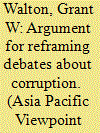

|
|
|
|
|
| Publication |
2013.
|
| Summary/Abstract |
There have been few attempts to identify the way different perspectives of corruption are employed in Papua New Guinea (PNG). The paucity of such analysis makes it difficult to identify the way scholars and policy-makers understand corruption in the country, in turn leading to potentially poor targeting of anti-corruption programmes. This article categorises perspectives of corruption that are found in academic and policy accounts of PNG. It finds that this literature is marked by an over-reliance on 'mainstream' Western interpretations of the definition, causes and solutions to corruption. In turn, it is argued that there is an important role that 'critical' and culturally aware academics can play in reframing debates about corruption in PNG and the Pacific.
|
|
|
|
|
|
|
|
|
|
|
|
|
|
|
|
| 2 |
ID:
119920


|
|
|
|
|
| Publication |
2013.
|
| Summary/Abstract |
This research reports on empirical findings of remote Pitcairn Island, the last remaining British Overseas Territory in the Pacific. It uses a qualitative methodology to discuss the island's potential for tourism development while recognising the issues and challenges faced by many small island developing states. However, as a sub-national island jurisdiction Pitcairn presents a number of issues unique to its temporal socio-political development and its centre periphery relationship with the metropole. The concept 'decolonising without disengaging' is posited to argue sub-national island jurisdictions are places/spaces of innovative, creative and differentiated development processes that offer interesting departures from the conventional realms of sustainable discourse and island development. This concept is posited as a strategy of empowerment whereby autonomy without sovereignty does not necessarily hinder the development of tourism industries.
|
|
|
|
|
|
|
|
|
|
|
|
|
|
|
|
| 3 |
ID:
119916
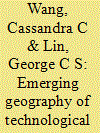

|
|
|
|
|
| Publication |
2013.
|
| Summary/Abstract |
This study critically evaluates the relevance of the existing theory of technological innovation to the case of China's information and communications technology industry. Based on a large-scale questionnaire survey conducted in China's three most important city-regions, namely, Beijing, Shanghai and Shenzhen, where the core of China's information and communications technology industry is located, this study reveals a significant regional variation in technological innovation in a political economy undergoing marketisation and globalisation. This research has found no significant relationship between the innovative performance of firms and the extent of production linkages; nor was there a significant knowledge exchange among firms. A further analysis has identified the significant role played by government purchases, research and development capital input and export propensity in the process of technological innovation. The findings of this research cast doubts over the prevailing theory of 'new economic geography' in which soft and unbounded relational assets have been overemphasised at the expense of some solid and bounded actors and agents that are pivotal to technological innovation in a developing economy.
|
|
|
|
|
|
|
|
|
|
|
|
|
|
|
|
| 4 |
ID:
119921
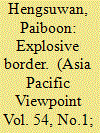

|
|
|
|
|
| Publication |
2013.
|
| Summary/Abstract |
The Salween borderlands can be conceptualised as spaces of exception where contradictory outcomes of state actions lead to state violence. The Burmese and Thai states have maintained their sovereign power and responded to economic regionalisation through violent practices in particular spaces. The political conflicts between the Burmese junta and ethnic minorities in the Salween borderlands have become war zones. The Burmese government in association with the Thai state and transnational dam investors has imposed the Salween dam projects on the Salween borderlands and people in the form of a terrorising state. The border people have experienced fear, danger and military violence, which has become part of the violence in everyday life. This paper provides an ethnographic study focused on specific events involving an explosion and death in a particular place and time on the Salween borderland. It shows the suffering of the border people in relation to sovereign power.
|
|
|
|
|
|
|
|
|
|
|
|
|
|
|
|
| 5 |
ID:
119914


|
|
|
|
|
| Publication |
2013.
|
| Summary/Abstract |
Cyberjaya is one of a long line of aspiring science and technology parks in the Asia-Pacific region that have attempted to create a successful technopole, and in doing so become the 'Silicon Valley of Asia'. The paper attends to the place-making strategies through which Cyberjaya was positioned as a new 'global hub' for information communication technology and multimedia industries, framed as an extremely 'sticky place' (Markusen, 1996). That is, a place within a global economic system where local skills, infrastructure and capital attracts and makes research and development and corporate headquarters reluctant to leave. The paper considers that despite considerable infrastructural investment and state-led urban boosterism to 'sell' Cyberjaya to prospective investors, more than 10 years after its completion in 1999 the development has become little more than a zone of disconnected business process outsourcing industries comprising low value-added outsourcing activities.
|
|
|
|
|
|
|
|
|
|
|
|
|
|
|
|
| 6 |
ID:
119915
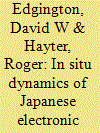

|
|
|
|
|
| Publication |
2013.
|
| Summary/Abstract |
This paper contributes to the theory of subsidiary evolution in multinational corporations through utilising a value chain approach. It assesses the changing activities of the branches of Japanese electronics firms located in Southeast Asia (the ASEAN region) since the 1997-1998 financial crisis. In the paper, we argue that a modest development of Japanese subsidiaries has occurred in this region during the past 10 years or so. We connect models of subsidiary development to Michael Porter's value chain in the results of a set of interviews with 37 managers in the factories, sales offices and regional headquarters of Japanese subsidiary companies located in Singapore, Malaysia and Thailand. We show that decentralisation of management functions from Japan occurred in both primary and support activities of the value chain. However, corporate long-term research and development did not disperse to Southeast Asia and is unlikely to in the near future. The article interprets these results and highlights the need for further research relating to the evolving geography of Japanese electronics multinational corporations and their subsidiaries in Southeast Asia.
|
|
|
|
|
|
|
|
|
|
|
|
|
|
|
|
| 7 |
ID:
119917


|
|
|
|
|
| Publication |
2013.
|
| Summary/Abstract |
This paper applies discourse analysis to policies surrounding the siting of radioactive waste disposal facilities in South Korea. We question the premises of previous studies that define the radioactive waste disposal facilities decision outcomes in Korea as 'repeated failures'. Instead, we suggest that underlying ideas and value systems surrounding the policy problem differ between supporting and opposing parties. In particular, our focus is on the 'framing' strategies manifest in policy discourse. Our analysis of newspaper articles shows that participants define and frame the policy issue in distinctive ways. Framing strategies include selective attention to, and naming of, the policy issues in the processes of frame articulation, amplification, extension and transformation. Overall, our analysis shows that framing analysis is a useful tool for understanding the policy decision-making process from a different perspective than traditional policy analysis.
|
|
|
|
|
|
|
|
|
|
|
|
|
|
|
|
| 8 |
ID:
119919
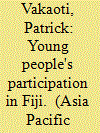

|
|
|
|
|
| Publication |
2013.
|
| Summary/Abstract |
Young people's participation is central to the attainment of meaningful governance systems. In Fiji, this is a challenge as the traditional view of young people's participation is restricted to that of 'service' and the precarious political environment restricting free expression. Despite these concerns, young people's participation and expression appear to be thriving in hybridised forms. This paper draws from conversations with a group of 'active' young people and discusses the merits and challenges of their participation in Fiji. As a nation, Fiji is at the threshold of a new socio-political era, where young people are expected to play a significant role. This discussion offers an understanding of young people's participation in Fiji and draws attention to how they can be meaningfully supported as active citizens in the process of national development.
|
|
|
|
|
|
|
|
|
|
|
|
|
|
|
|